2022-07-05 • Network conntest Roxin params
Contents
2022-07-05 • Network conntest Roxin params¶
Imports¶
#
using Revise
using MyToolbox
using VoltoMapSim
[ Info: Precompiling VoltoMapSim [f713100b-c48c-421a-b480-5fcb4c589a9e]
Params¶
Based on Roxin (see previous nb).
d = 6
p = get_params(
duration = 10minutes,
p_conn = 0.04,
g_EE = 1 / d,
g_EI = 18 / d,
g_IE = 36 / d,
g_II = 31 / d,
ext_current = Normal(-0.5 * pA/√seconds, 5 * pA/√seconds),
E_inh = -80 * mV,
to_record = [1, 801],
);
# dumps(p)
Run sim¶
s = cached(sim, [p.sim]);
Uncached output:
Running simulation: 100%|███████████████████████████████| Time: 0:11:31
Saving output at `C:\Users\tfiers\.phdcache\datamodel v2 (net)\sim\b77ff1c19d7f1e33.jld2` … done (0.7 s)
function augment_simdata(s, p)
num_spikes_per_neuron = length.(s.spike_times)
spike_rates = num_spikes_per_neuron ./ p.sim.general.duration
return (; s..., num_spikes_per_neuron, spike_rates)
end;
s = augment_simdata(s,p);
import PyPlot
using VoltoMapSim.Plot
tlim = @. 3minutes + [0,10]seconds;
tlim = [0,10]seconds;
rasterplot(s.spike_times; tlim);
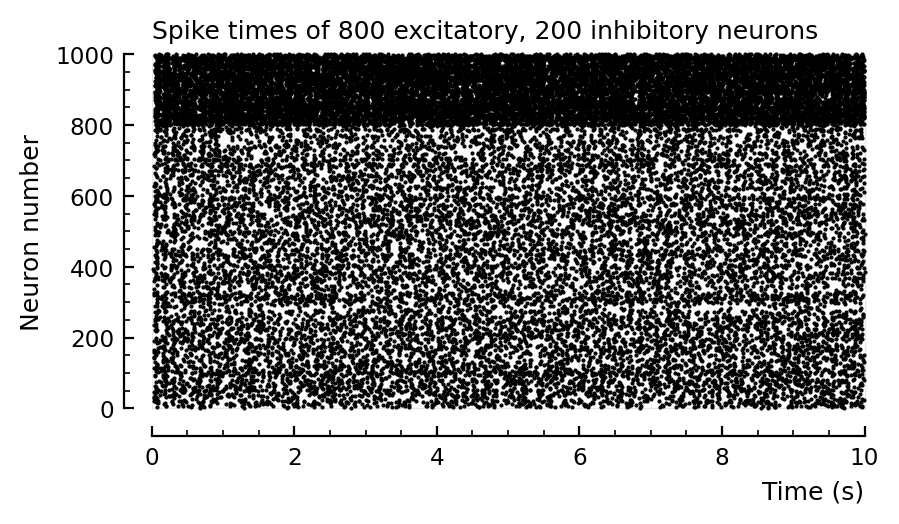
histplot_fr(s.spike_rates);
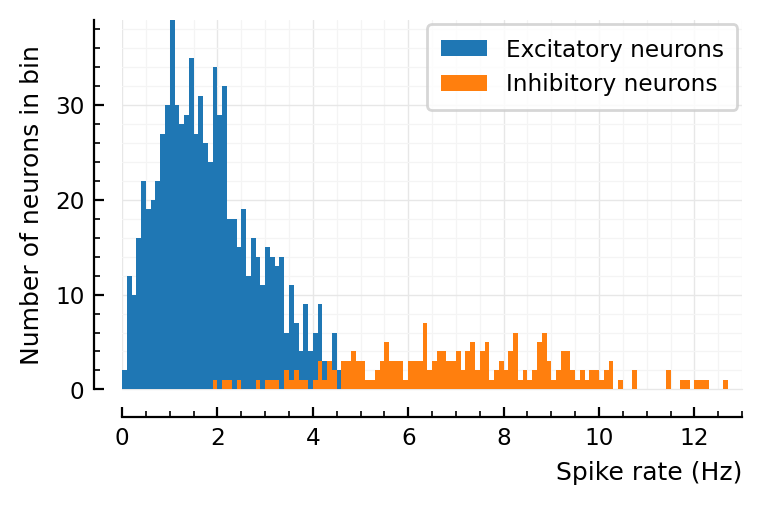
Aggregated and on log scale (to compare with Roxin fig 8D):
bins = exp10.(-3:0.2:3)
fig, ax = plt.subplots()
ax.hist(s.spike_rates; bins)
set(ax, xscale="log", xlabel="Spike rate (Hz)", xlim=(0.01,100));
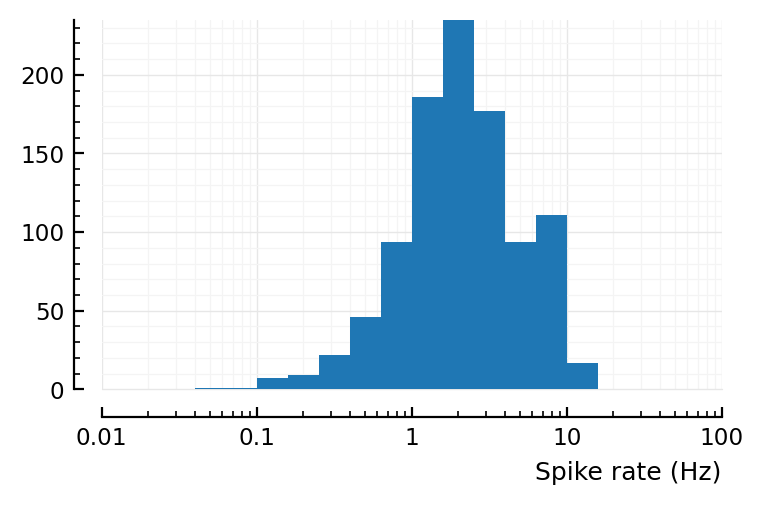
# VI_sigs = add_VI_noise(s.voltage_traces, p);
# ax = plotsig(s.timesteps, VI_sigs[1] / mV; tlim, label="VI signal");
# ax = plotsig(s.timesteps, s.signals[1] / mV; tlim, ax, label="Membrane voltage")
# legend(ax, reorder=[2=>1])
# set(ax, xlabel="Simulation time (s)", ylabel="mV");
Connection test¶
analyzed_neuron = 1; # neuron ID
v = s.signals[analyzed_neuron].v;
input_neurons = s.input_neurons[analyzed_neuron]
length(input_neurons)
36
input_neurons_by_type = CVec(exc=[n for n in input_neurons if s.neuron_type[n] == :exc],
inh=[n for n in input_neurons if s.neuron_type[n] == :inh])
ComponentVector{Int64}(exc = [11, 33, 66, 70, 101, 132, 136, 139, 145, 169 … 446, 447, 516, 565, 597, 629, 681, 710, 766, 800], inh = [829, 831, 894, 897, 902, 908, 914, 922, 928, 988])
length(input_neurons_by_type.exc),
length(input_neurons_by_type.inh)
(26, 10)
unconnected_neurons = [n for n in s.neuron_IDs if n ∉ input_neurons && n != analyzed_neuron];
length(unconnected_neurons)
963
Highest firing inputs
sort!(collect(zip(input_neurons, s.spike_rates[input_neurons])), by = tup -> tup[2])
36-element Vector{Tuple{Int64, Float64}}:
(337, 0.152)
(33, 0.29)
(136, 0.623)
(516, 0.683)
(800, 0.832)
(70, 0.833)
(66, 0.94)
(169, 0.958)
(303, 1.2)
(145, 1.26)
(629, 1.31)
(101, 1.32)
(418, 1.41)
⋮
(922, 3.41)
(565, 4.46)
(908, 4.69)
(312, 4.84)
(829, 6.09)
(897, 7.96)
(831, 8.8)
(914, 8.82)
(928, 8.94)
(902, 10.2)
(894, 11.5)
(988, 11.8)
highest_firing_inputs = sort(input_neurons, by = id -> s.spike_rates[id], rev = true);
highest_firing_inputs[1]
988
plotSTA(v, s.spike_times[highest_firing_inputs[1]], p);
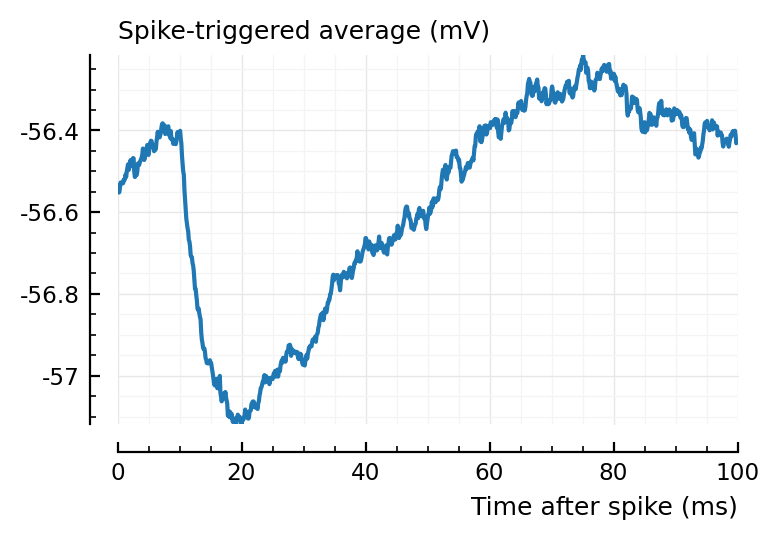
highest_firing_exc_inputs = [n for n in highest_firing_inputs if s.neuron_type[n] == :exc]
highest_firing_inh_inputs = [n for n in highest_firing_inputs if s.neuron_type[n] == :inh]
highest_firing_exc_inputs[1], highest_firing_inh_inputs[1]
(312, 988)
plotSTA(v, s.spike_times[highest_firing_exc_inputs[1]], p);
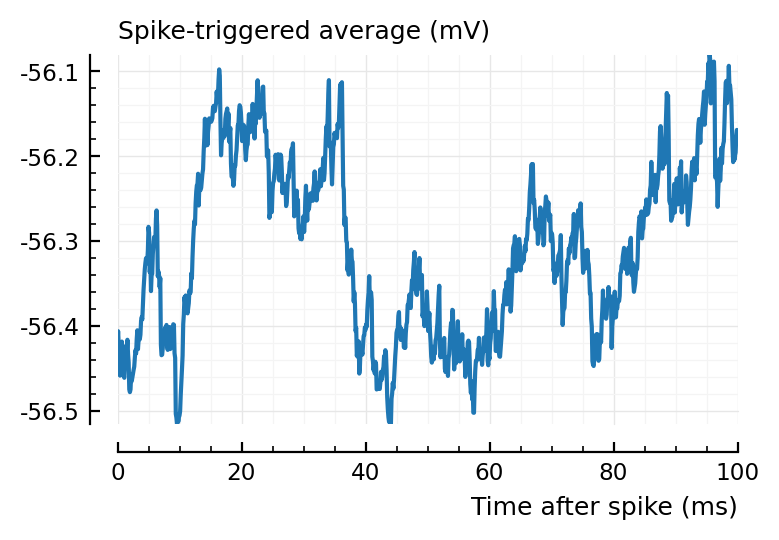
plotSTA(v, s.spike_times[highest_firing_inh_inputs[2]], p);
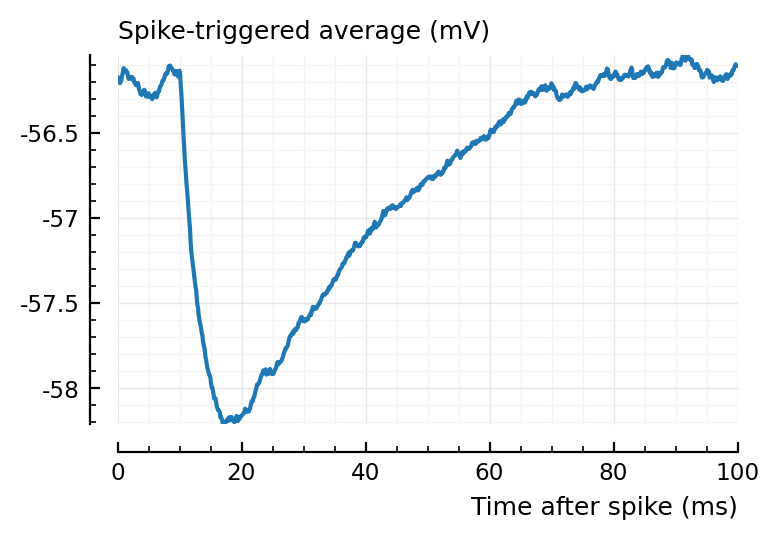
I→E STAs are much cleaner. This is likely bc their synaptic weights are 36x larger.
spiketrains_by_type = (;
conn = (;
exc = [s.spike_times[n] for n in input_neurons_by_type.exc],
inh = [s.spike_times[n] for n in input_neurons_by_type.inh],
),
unconn = [s.spike_times[n] for n in unconnected_neurons],
);
perf = evaluate_conntest_perf(v, spiketrains_by_type, p);
UndefVarError: spiketrains_by_type not defined
Stacktrace:
[1] top-level scope
@ In[71]:1
[2] eval
@ .\boot.jl:373 [inlined]
[3] include_string(mapexpr::typeof(REPL.softscope), mod::Module, code::String, filename::String)
@ Base .\loading.jl:1196
(see bottom of notebook)
All inhibitory detected! :D
This is cause I changed reversal potential from -65 to -80 mV; and cause 36x stronger synapses (both following Roxin).
Check whether detected exc inputs are the highest firing ones.
fr = Float64[]
pval = Float64[]
for (i,n) in enumerate(input_neurons_by_type.exc)
push!(fr, spike_rates[n])
push!(pval, perf.p_values.conn.exc[i])
end
ax = plot(fr, pval, "k.", clip_on = false, xlabel="Firing rate (Hz)", ylabel="p-value conntest", ylim=(0,1));
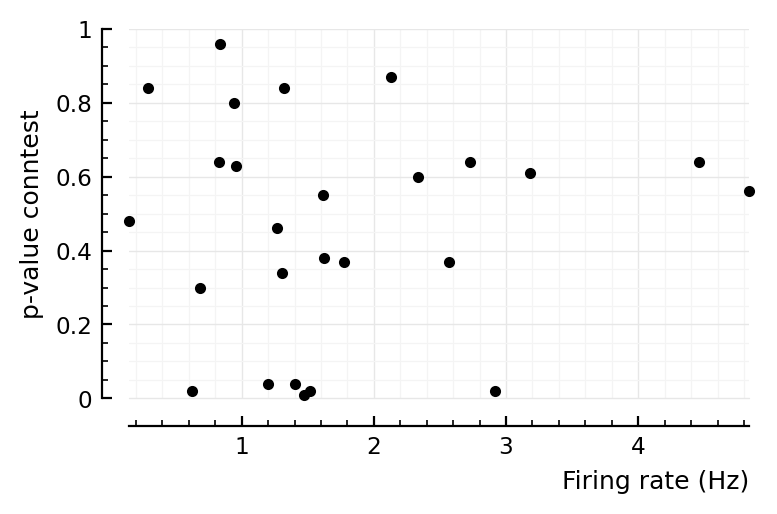
No, doesn’t seem like it.
Plot STA of detected exc inputs.
show(perf.p_values.conn.exc)
Any[0.01, 0.84, 0.8, 0.96, 0.84, 0.6, 0.02, 0.87, 0.46, 0.63, 0.38, 0.04, 0.56, 0.48, 0.02, 0.04, 0.37, 0.64, 0.3, 0.64, 0.02, 0.34, 0.61, 0.55, 0.37, 0.64]
N = length(input_neurons_by_type.exc)
for i in sortperm(perf.p_values.conn.exc)[[1,2,N-1,N]]
plotSTA(v, s.spike_times[input_neurons_by_type.exc[i]], p)
end
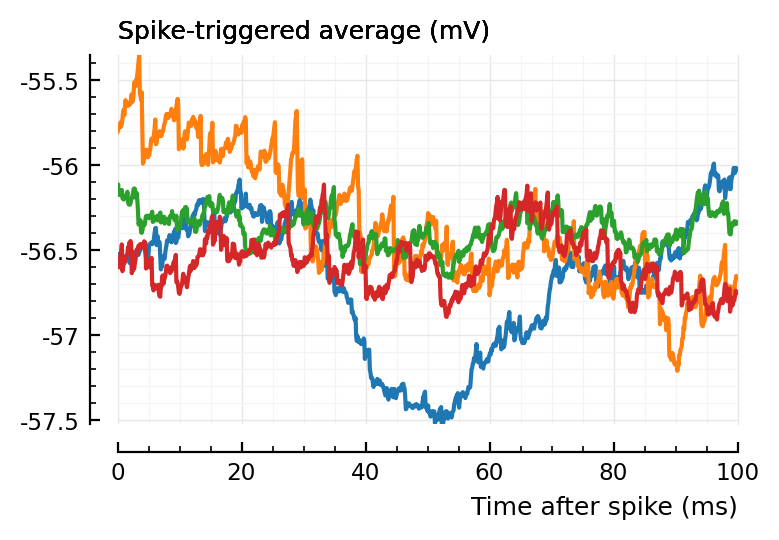
blue and orange are the two lowest p-values, green and red the highest (worst, undetected).
Test connections to an inhibitory neuron¶
function neuron_info(n, s, p)
# Return exc and inh inputs, sorted so the highest firing are first.
# n = neuron ID
# s = augmented simdata
# p = ExperimentParams
input_neurons = sort(s.input_neurons[n], by = m -> s.spike_rates[m], rev = true)
exc_inputs = [m for m in input_neurons if s.neuron_type[m] == :exc]
inh_inputs = [m for m in input_neurons if s.neuron_type[m] == :inh]
unconnected_neurons = [m for m in s.neuron_IDs if m ∉ input_neurons]
spiketrains = (
conn = (
exc = [s.spike_times[m] for m in exc_inputs],
inh = [s.spike_times[m] for m in inh_inputs],
),
unconn = [s.spike_times[m] for m in unconnected_neurons],
)
return (;
exc_inputs,
inh_inputs,
unconnected_neurons,
spiketrains,
v = s.signals[n].v,
num_inputs = (exc = length(exc_inputs), inh = length(inh_inputs)),
)
end;
ni = neuron_info(801, s, p);
ni.num_inputs
(exc = 21, inh = 10)
ax1 = plotSTA(ni.v, ni.spiketrains.conn.exc[1], p);
ylim = ax1.get_ylim()
plotSTA(ni.v, ni.spiketrains.conn.exc[2], p; ylim);
plotSTA(ni.v, ni.spiketrains.conn.exc[3], p; ylim);
plotSTA(ni.v, ni.spiketrains.conn.exc[end], p; ylim);
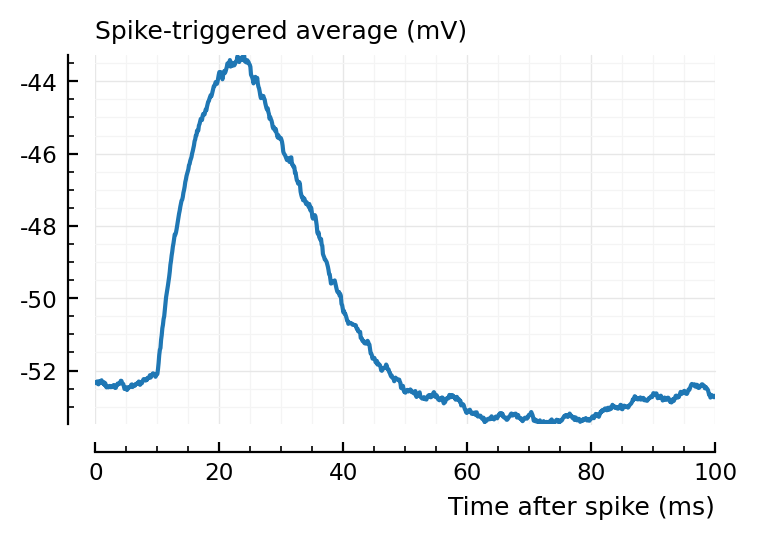
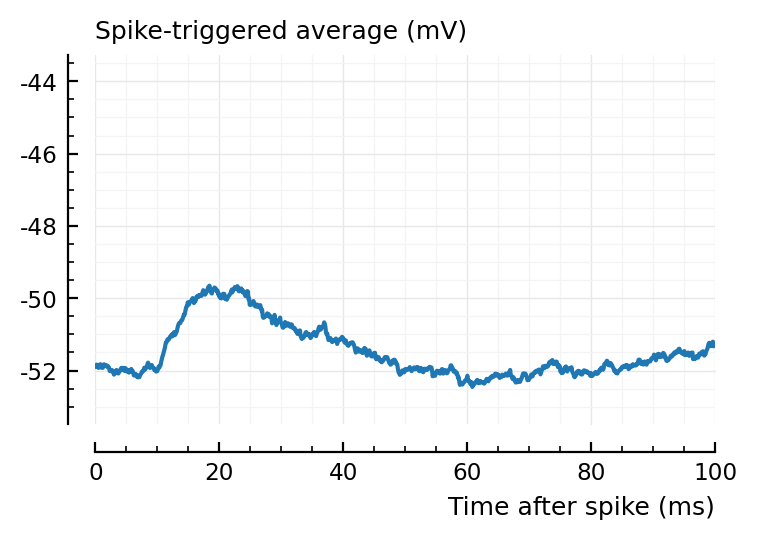
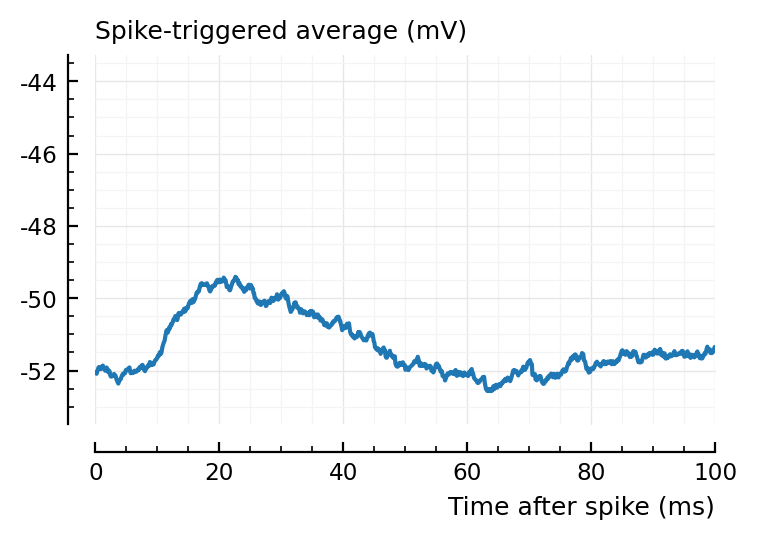
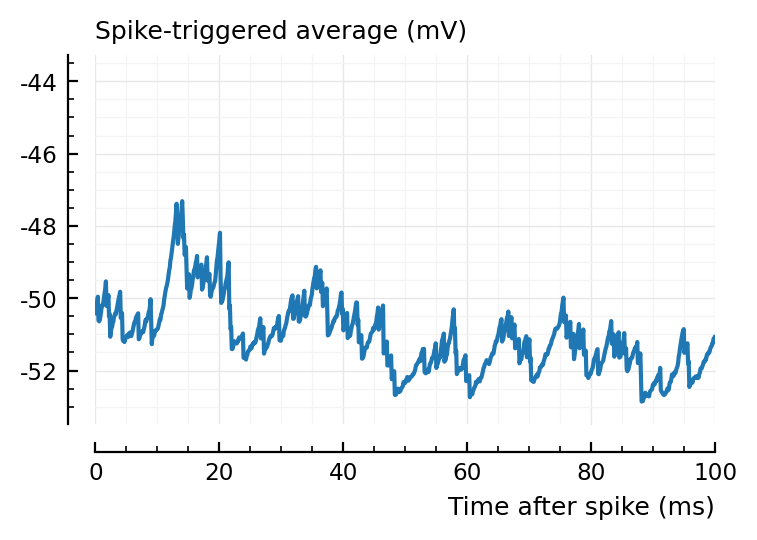
ax1 = plotSTA(ni.v, ni.spiketrains.conn.inh[1], p);
ax2 = plotSTA(ni.v, ni.spiketrains.conn.inh[2], p);
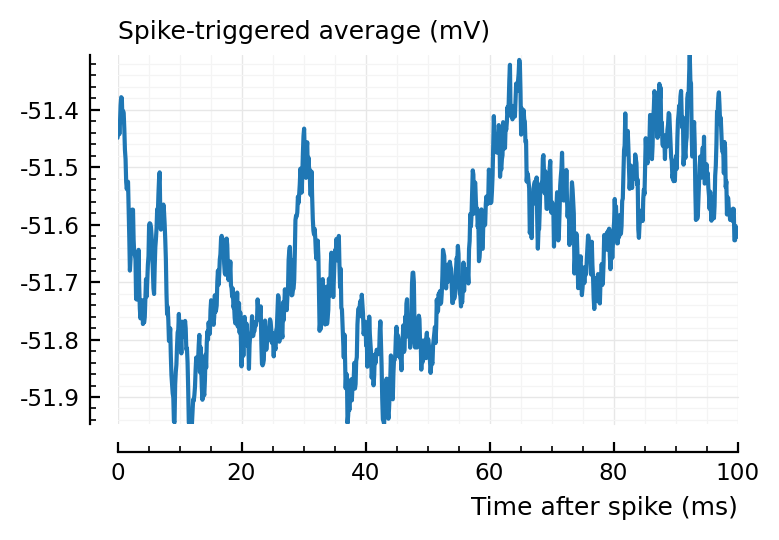
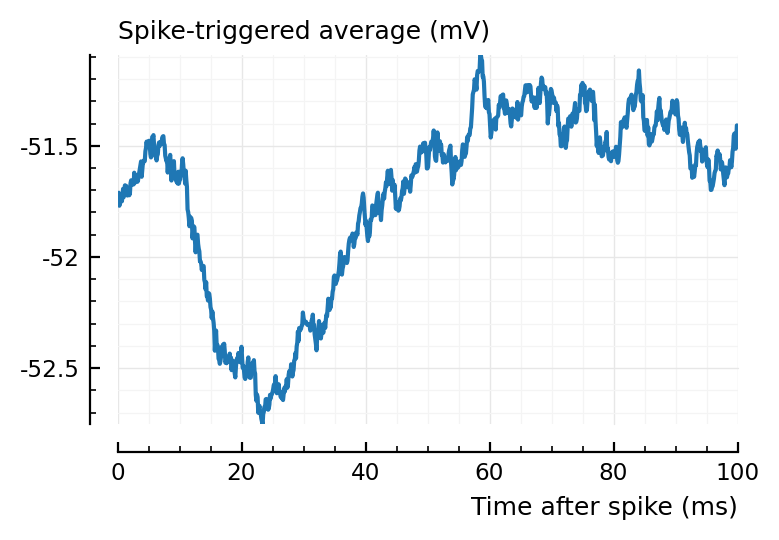
perf = evaluate_conntest_perf(ni.v, ni.spiketrains, p);
Testing connections: 100%|██████████████████████████████| Time: 0:00:289m
perf.detection_rates
(TPR_exc = 0.714, TPR_inh = 0.9, FPR = 0.05)
15/21 exc inputs detected, 9/10 inh.
2/40 tested unconnected.
Use neuron_info for neuron 1¶
ni1 = neuron_info(1, s, p);
ni1.num_inputs
(exc = 26, inh = 10)
for i in 1:2
plotSTA(ni1.v, ni1.spiketrains.conn.exc[i], p)
end
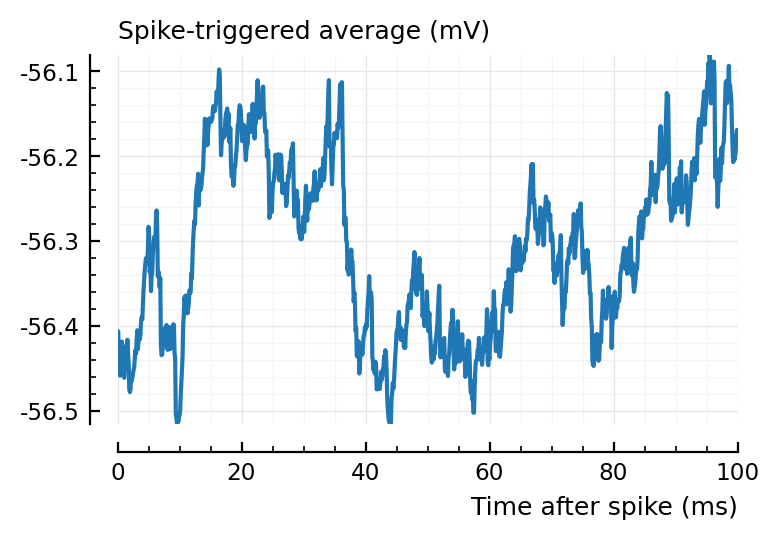
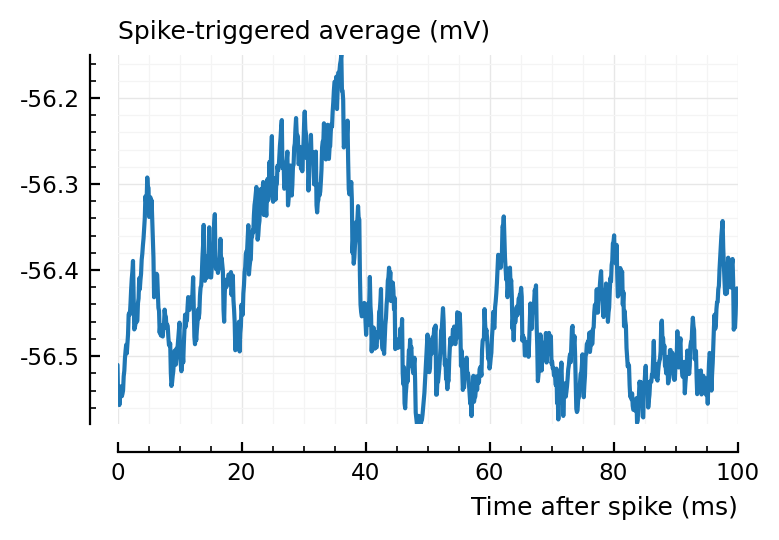
ax1 = plotSTA(ni1.v, ni1.spiketrains.conn.inh[3], p);
ylim = ax1.get_ylim()
plotSTA(ni1.v, ni1.spiketrains.conn.inh[1], p; ylim);
plotSTA(ni1.v, ni1.spiketrains.conn.inh[2], p; ylim);
plotSTA(ni1.v, ni1.spiketrains.conn.inh[end], p; ylim);
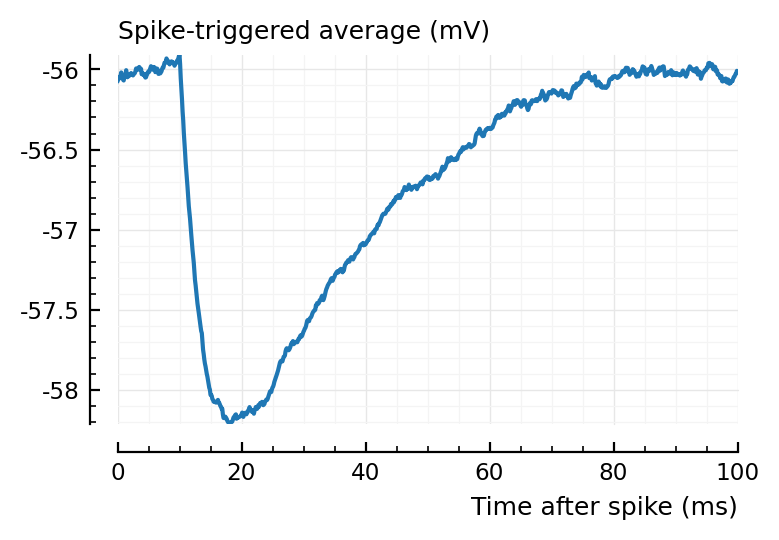
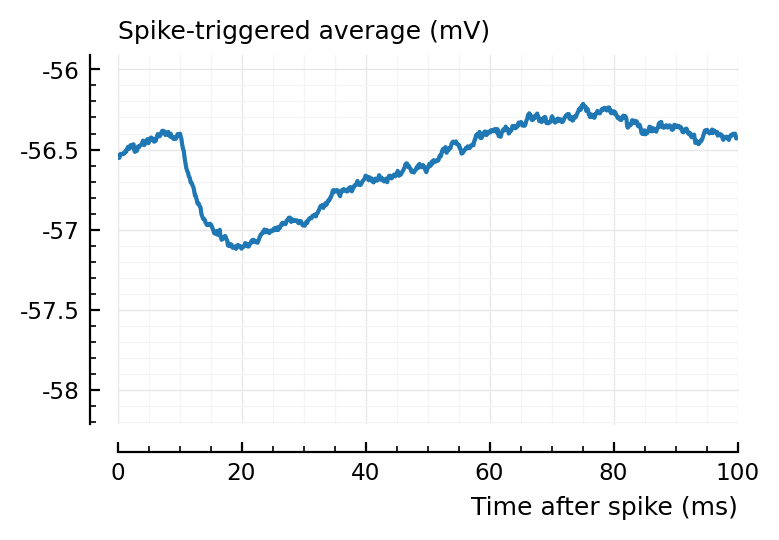
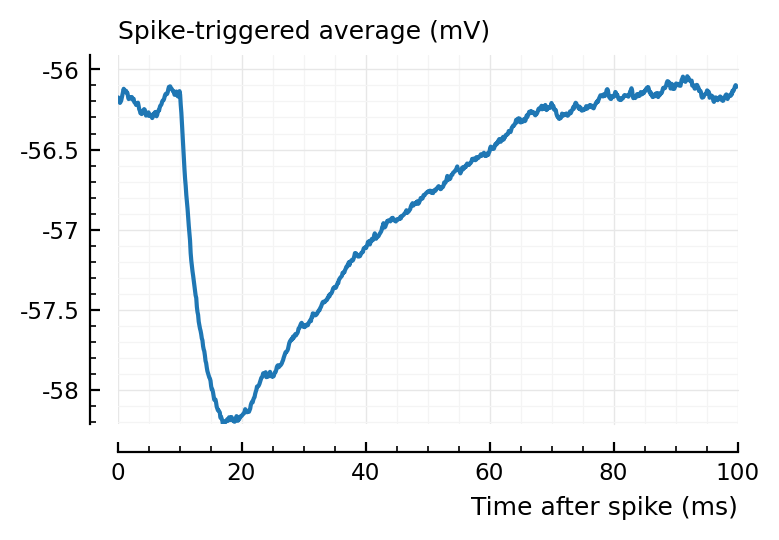
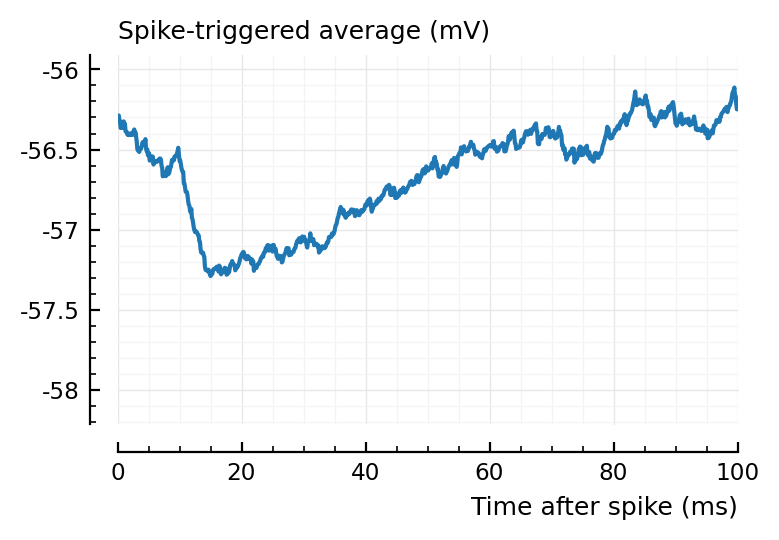
perf = evaluate_conntest_perf(ni1.v, ni1.spiketrains, p);
Testing connections: 100%|██████████████████████████████| Time: 0:00:31
perf.detection_rates
(TPR_exc = 0.154, TPR_inh = 1, FPR = 0.15)